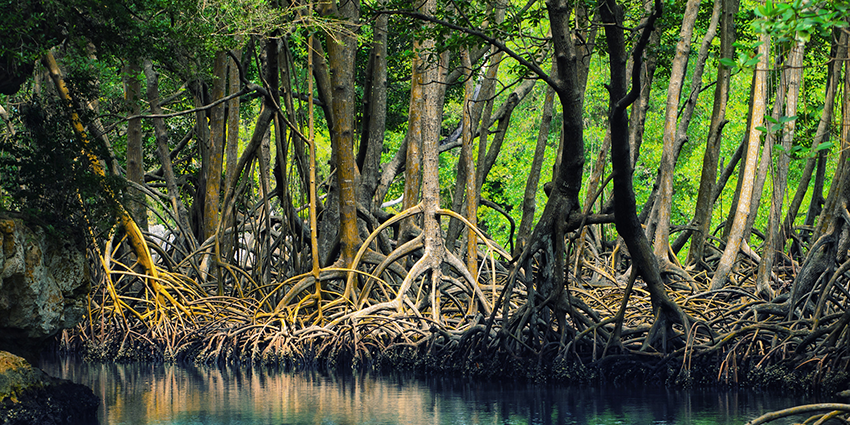Coastal guardians at risk: Cyclones and rising seas threaten mangroves
About half of global mangrove ecosystems are at risk from changes in tropical cyclone activity and sea level rise. A study by Sarah Hülsen and colleagues from ETH Zürich, University of Colorado Boulder, and Stanford University, show mangroves providing the most ecosystem services are disproportionately affected.

The study combines modeled changes in tropical cyclone frequency and rates of sea level rise in a mangrove risk index for three different climate scenarios by 2100. Even for low emission scenarios, almost half of current global mangrove extents are at high to severe risk (40% for SSP245*, up to 56% for SSP585*). These projected changes in tropical cyclone activity, along with sea level rise could induce substantial changes in the mangroves’ ecosystem structure and functioning. Additionally, the more frequent occurrence of high tropical cyclone wind speeds could compromise the recovery of the mangrove ecosystems in between storm events.
Coastal populations across the globe benefit from the vital ecosystem services mangroves provide. Overlapping the risk index with data on mangrove ecosystem services including coastal protection for people and assets, carbon sequestration, and fishing benefits shows areas providing especially high services are most at risk.
Hotspots of severe risk in Southeast Asia are in the Philippines, Vietnam, Malaysia, and parts of Indonesia. In the Southwest Pacific, especially northern Australia, New Caledonia and Fiji, are also at severe risk. In Central America and Southeast Africa the east coast of Florida and the Bahamas, as well as in northern Mozambique and southern Tanzania.
The risk index highlights important areas for conservation activities and the monitoring of ecosystem functions.
Reference
Hülsen S, Dee LE, Kropf CM et al.: Mangroves and their services are at risk from tropical cyclones and sea level rise under climate change. Commun Earth Environ 6, 262 (2025). doi: external page 10.1038/s43247-025-02242-z
*A new set of climate scenarios has been developed with respect to the sixth IPCC report (IPCC AR6), the "Shared Socioeconomic Pathways" (SSPs). Compared to the previously used RCPs, the new SSP scenarios have been improved in a variety of ways. More about the SSP scenarios on the external page Deutsches Klimarechenzentrum website